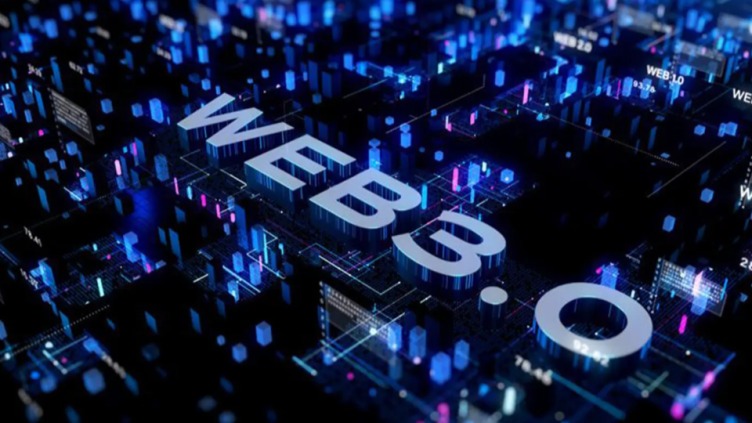3 Major Ways Web3 Will Disrupt The Financial Services Sector
11 October 2023
Web3 represents the next big evolutionary leap forward of the Internet – a leap that’s driven by blockchain, NFTs and cryptocurrency. In this future Internet, we’ll see more and more decentralization, meaning users will increasingly interact and transact without the need for third parties to oversee or authenticate interactions. Therefore, any business that functions as an intermediary service or middleman could be threatened by this new decentralized vision of the Internet. If I were a financial services provider, I’d be especially concerned.
Let’s explore how web3 – but particularly blockchain – will impact the finance sector.

The Age Of Decentralized Finance
One major consequence of Web3 is that it's enabled completely new banking models that side-step traditional banks and other financial institutions. And this has given rise to the decentralized finance or DeFi movement.
DeFi describes a new internet-native, crypto-based financial system where traditional intermediary services are replaced with smart contracts and blockchains in a peer-to-peer system. Basically, people can trade directly with each other, sending and receiving money to and from their digital wallets without the help of a centralized bank or other financial authority. But DeFi isn’t just about sending and receiving money – it’s an umbrella term that encompasses all sorts of financial transactions, including lending and stock trading. Think of DeFi as the crypto version of traditional financial products but without the regulation and oversight of traditional finance.
This lack of regulation is both a good and a bad thing. It's good because it frees us from the red tape and inefficiencies that come with traditional finance. It's not so good because it typically doesn't provide the same sort of consumer protections that you enjoy when you deal with a “normal” bank.
But focusing on the positives, DeFi has the potential to solve a lot of problems with the traditional banking system. For one thing, DeFi increases access to banking services for people all around the world who currently don’t have access to traditional banking providers or have been turned away by banks. With DeFi, all you need is access to the Internet. This is why many believe DeFi could create a better, more equitable financial system that serves everyone.
And from a technology point of view, the DeFi movement represents an internet-native financial system that's actually built for the Web3 era, as opposed to the existing banking system, which, for the most part, relies on massively outdated technology.
This all sounds great, right? Well, not so much if you’re one of those traditional financial services providers whose very existence may be threatened by the DeFi movement. If they want to survive, banks in the Web3 era will have to rethink their services and operations to ensure they're offering maximum value for customers. Blockchain could be a part of that. Which brings us to…
Blockchain And Everyday Banking
Blockchain technology is ideally suited to banking. After all, it was originally designed for storing transaction data, facilitating secure transactions, and creating a tamper-proof history of transactions. All of which will sound very familiar to banks.
I believe blockchain can help banks add value for their customers and stay relevant in the Web3 era. As an example, blockchain allows customers to move money quickly, easily and with lower transaction fees – and that includes across different currencies (including crypto), anywhere in the world. Blockchain-based money transfer network Ripple is a great example. Ripple has its own cryptocurrency, XRP, but can facilitate money exchanges across a variety of government-backed currencies, cryptocurrencies and even assets like gold. So, it can process transactions around the world and serve as a trusted facilitator of transactions between two parties – like a traditional financial services provider, but built for Web3. In this way, it's a bit like the Web3 equivalent of the SWIFT money transfer network.
The major benefits for consumers are transactions generally take just a few seconds – compared to days for a traditional bank wire transfer – and fees are tiny (for each transaction, Ripple deducts a tiny amount in XRP, a fraction of a penny at current rates). Some traditional banks – including Santander, Axis Bank and PNC Bank– are beginning to use the Ripple network, and we’ll probably see more banks follow suit.
Blockchain May Even Overhaul Lending
In the traditional lending model, the money we deposit into our bank accounts is used to fund loans issued by the bank, and in return, we get a small amount of interest on the money we deposit with the bank. The bank is responsible for vetting borrowers, keeping track of records, and collecting funds.
Web3 and blockchain-based lending could challenge this traditional model and put consumers in the driving seat. With Web3, depositors no longer have to entrust their money to a bank, which then lends that money out; instead, they can deposit their funds into a blockchain-based wallet with a smart contract. The smart contract then acts kind of like an escrow account, holding the money and disbursing funds to borrowers when certain conditions are met (such as providing collateral). All terms of the loan (interest, etc.) are visible in the smart contract to all participants. The smart contract also manages the repayment of the loan, and the interest is paid back to the original depositors.
This is already happening. According to McKinsey, more than $200 billion worth of loans was disbursed by Web3 lending platforms in 2021. And it all takes place without a bank to facilitate the transaction. It’s essentially the Web3 version of those peer-to-peer lending and crowdfunding platforms that sprang up several years ago.
But just because blockchain lending is a part of the DeFi movement doesn't mean banks shouldn't consider using blockchain themselves to improve lending processes. In other words, while Web3 does pose a threat to the financial sector, it also brings incredible opportunities.
Related Articles
10 Amazing Things You Can Do With Apple Intelligence On Your IPhone
Apple Intelligence is poised to revolutionize the iPhone experience, offering a suite of AI-powered tools that promise to make your digital life easier, more productive, and more creative.[...]
Agentic AI: The Next Big Breakthrough That’s Transforming Business And Technology
The world of artificial intelligence is evolving at a breakneck pace, and just when you thought you'd wrapped your head around generative AI, along comes another game-changing concept: agentic AI.[...]
The Employees Secretly Using AI At Work
Imagine walking into your office and noticing your colleague Sarah effortlessly breezing through her tasks with uncanny efficiency.[...]
Battling AI Fakes: Are Social Platforms Doing Enough?
Since generative AI went mainstream, the amount of fake content and misinformation spread via social media has increased exponentially.[...]
Creating The Universal AI Employee Of The Future
Imagine a world where your most productive employee never sleeps, never takes a vacation, and can seamlessly adapt to any role you need.[...]
20 Generative AI Tools For Creating Synthetic Data
The AI revolution that we’re currently living through is a direct result of the explosion in the amount of data that’s available to be mined and analyzed for insights.[...]
Sign up to Stay in Touch!
Bernard Marr is a world-renowned futurist, influencer and thought leader in the fields of business and technology, with a passion for using technology for the good of humanity.
He is a best-selling author of over 20 books, writes a regular column for Forbes and advises and coaches many of the world’s best-known organisations.
He has a combined following of 4 million people across his social media channels and newsletters and was ranked by LinkedIn as one of the top 5 business influencers in the world.
Bernard’s latest book is ‘Generative AI in Practice’.










Social Media